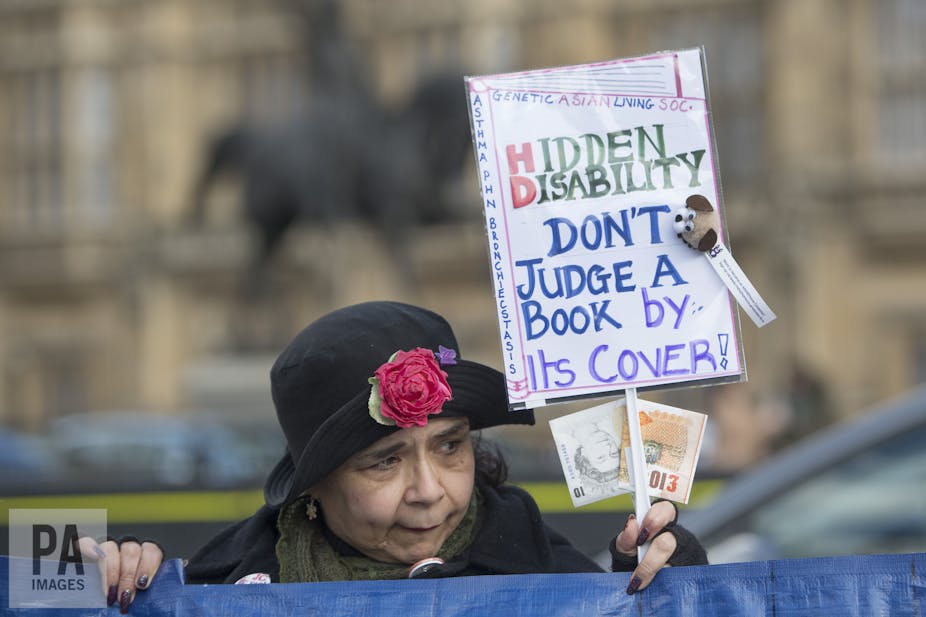In a major undertaking, the government announced in late January that it will review all 1.6m claims for Personal Independence Payments (PIP) – one of the benefits that supports people with a disability.
There are serious issues with the benefits applications process, and many disabled people who claim Employment and Support Allowance (ESA) or PIP find the process very stressful. In just over two years, the British government has spent more than £100m managing reviews and appeals against their disability benefits decisions.
My new research found that people who receive disability benefits find changes to the system powerfully dehumanising. Changes since 2010 have included cuts to the financial support that people receive and the introduction of new types of benefits – the ESA and PIP – which have tighter eligibility criteria than the previous benefits. With the move to ESA, the work capability assessment was introduced, where some people with degenerative conditions faced regular reassessments for their eligibility to claim support, although this was overturned in late 2016.
More changes are coming, as the government gradually rolls out Universal Credit – which will eventually replace ESA – across the country.
Left feeling powerless
Many of the 15 claimants I spoke to from across the UK found the application process too complex and bureaucratic – and therefore unsuitable for people who are unwell, particularly those with fluctuating or degenerative conditions. They worried that the assessors were not qualified enough to understand specific conditions such as fibromyalgia or to consider the impact of having multiple disabilities, and that they neglected to consider medical evidence.
Claimants worried that assessments were politically and ideologically driven. One 48-year old woman who transferred across to ESA and PIP from the old benefits told me that the assessments were “deliberately slanted to remove people from social security”, leading to a sense of powerlessness.
Read more: We showed I, Daniel Blake to people living with the benefits system: here's how they reacted
The perpetual uncertainties in the benefit system had significant psychological implications for claimants. A 52-year-old woman with multiple disabilities told me: “I’ve been … excessively worrying … really fearful and anxious about it all.”
Claimants described how they had been stereotyped as “scroungers” and “benefit scum” by members of the public, and that they did not view themselves as equal citizens in society. They told me they thought the media and government perpetuated the perception of claiming benefits as a “lifestyle choice”, and were deeply affected by television programmes that portray benefit claimants in a negative light.
Those with non-visible disabilities, such as arthritis, felt that others judged them as undeserving of welfare support and felt they had to justify their needs. One 28-year-old man who had multiple sclerosis (MS) and had lost financial support in the transfer from Disability Living Allowance to PIP told me: “They are cynical or sceptical about my disability because I appear to be quite normal.”
Others described being treated unjustly and feeling humiliated by staff in the benefits system and by the general public. One 38-year-old woman with Myalgic Encephalomyelitis, known as ME, told me about her assessment:
I’ve got a bag full of tablets and (the assessor) managed to tip them all on the floor and then watched me for five minutes trying to pick them up before she bothered offering any help.
Impact on mental health
These experiences had a detrimental impact on claimants’ mental and physical health and well-being. Four out of my fifteen interviewees mentioned feeling suicidal – two said they had actually attempted suicide. Stress and feeling low exacerbated their physical health difficulties, such as chronic pain and fatigue – and physical health challenges exacerbated low moods, in what became a vicious cycle. The 28-year-old man with MS told me:
It is a two-way thing so I am unable to go out because I feel awful and then because I can’t go out I feel doubly awful.
I found that changes to the benefit system had a significant impact on people’s sense of themselves. Some claimants were required to present themselves as more disabled for benefits applications than for other social situations such as going to work or seeing friends, which led to a focus on their limitations. One 31-year-old woman who uses a wheelchair described her PIP application:
The focus has to be on all the things that you can’t do in life … that certainly wouldn’t be a way that would be helpful to live my life.

Many described feeling less worthy than others and said they judged both themselves and other claimants. The stigma surrounding benefits was so potent that many claimants felt an intense sense of shame about receiving support, which led to them hiding it from others. This exacerbated the pressure of living with a physical health difficulty and the isolation associated with financial difficulties. Some were even deterred from claiming benefits to which they were entitled.
For the people that I interviewed, there were signs that changes to the benefit system had caused significant psychological distress and exclusion from full citizenship. The government’s review of all PIP claims is too little, too late – the damage has already been done. More support is needed for disabled people to afford a basic standard of living and to be full citizens within society.

